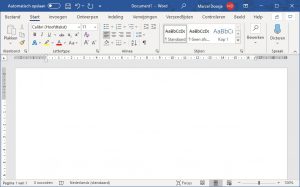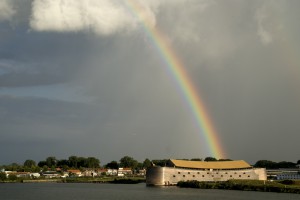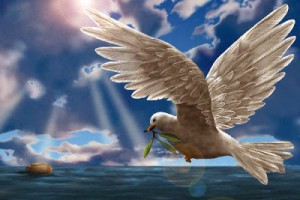
Since under the current circumstances, we cannot celebrate our monthly Morning Prayers as regularly, Revd. Rudolf Oosterdijk has written a sermon for publication online. Please read it below (in English only).
Sermon on Genesis 8, 6-16 and John 20, 24-29
For the Morning Prayer service as planned in the Groninger Martinikerk, Sunday Quasimodo Geniti, 19th of April 2020
In the name of the Father and of the Son and of the holy Spirit. Amen.

White is a colour. Or is it? Some people say ‘yes’, others ‘no’. Which answer you give, depends probably on your knowledge of the refraction of light! But we all – I dare say – experience white as a colour. As a cheerful colour even. That’s why the Sundays of Eastertide have white as their colour. It is a colour with a symbolic meaning as well. White means blank, unmarked, untarnished. White is a painter’s canvas, until he or she applies brush or pencil. White is your pc screen before you start writing. Every painter, every writer is strangely hesitant to paint the first stroke, to write the first word. That’s because this first move somehow determines the whole creation. But the white – be it screen or canvas – is an invitation to you to begin your work.

It’s an old tradition after Easter to go back in the Bible, to where it all began. A new creation, after Christ’s resurrection. Genesis 8 tells us about a new creation, literally! The first creation was about ‘dividing’. God divided day from night. He divided the waters under the earth from those above the earth. He divided the land from the sea. And then he divided human being from himself. Adam and Eve were made in God’s image and likeness, but still they were other than God. How god-like man in knowledge and skill, shaping and determining his own existence, he can never be as God. But, alas, the first creation ends in disaster. Man dominates all that lives, including his fellow men. And God is sorry that he made man and he wipes what he made off the earth. Like an artist he takes a white sheet and starts afresh. That is the story of the Flood. God hides his face behind the clouds and forty days of rain erase the whole of creation. Noah and his chosen ones float on the waters in a coffin-like ship. And then God shows his friendly face once more. The waters begin to subside and Noah’s ark grounds on a mountain in Ararat.

And then there is this wonderful story about the birds, full of a deeper meaning. Noah opens a window and lets out a bird. The raven, with his sharp eyes, sees where he can find his food and never returns. Then Noah releases a dove. It brings back an olive leaf: a sure sign that she has found dry land. It is a sure sign that once more creation has begun. And Noah opens the coffin-like ship and sets foot on the ground. The earth as a white sheet, ready for a new beginning. It is a story like the resurrection!
We find the story of the Flood difficult to understand. It reminds us of the floods of our time: the tsunami in Japan in 2009, the tsunami in Haiti and other countries on Boxing Day in 2006, the ‘Watersnoodramp’ in the Netherlands in 1953. Whole villages, buildings were swept away by the waters. Thousands of people drowned. Animal life was killed. Now, in 2020, the corona virus spreads like a flood through our countries and kills the most vulnerable in our societies. It makes us ask ‘why’? Is it fair that innocent people die? Is there a purpose to it? Is it God’s doing? In the Bible God has a darker side. It is his fury, his just anger because of the evil and the unrighteousness men and women commit. In Genesis this is the God who opens heaven’s floodgates and wipes away his own creation. In the Gospel it is the God who on Good Friday brings darkness upon the earth and lets his son die at the hands of men. And God has a lighter side. That is his forgiveness, his mercy. He is the love that was undeniably there on Easter morning. Believing in God is not easy. Walking with him means rejoicing in his lighter side and, sometimes, be confronted by his darker side. It is accepting that God will always be a mystery to us and choosing to live, foremost, with his love.
With that in mind we should, I think, read the story of the Flood. Not, in the first place, as a story of disaster, condemnation and punishment. Yes, though admitting these are all there, we should read it as a story of the new beginning. God gives a new beginning; the Bible tells us so on almost every page. It is certainly the message to Jesus’ disciples on Easter morning: God’s lighter side has won over his darker side, for good. We all are invited to rise up and make a new beginning. Living with God is, in fact, as hard as life itself. We choose our own path, make our own decisions. We shape our own existence. We are like the writer in front of his white paper, like the painter berore his white canvas. But we all share the experience that, at some point in our lives, most or all that we have done is wiped away, that all our efforts seem to have been for nothing. And we must find the courage to start afresh. Is there such thing as ‘starting afresh’? What we lived through is still in our minds, made an impression on our souls. We cannot start afresh, because we are who we are, yesterday, today and tomorrow! But we should ask ourselves: will we let yesterday determine what we do today or plan for tomorrow? Which way do we want to look: backwards of forwards, back to the time that is past of forward to the time that is given to us?
Easter means: a new beginning has been given to us; a new era lies before us. But it takes courage to accept this new beginning, to enter this new era. After Easter morning Jesus’ disciples lock themselves up in their homes. They do not understand what happened, are afraid of the future. Thomas, even, is afraid of the risen Christ. Doubt has overshadowed his former faith. Doubt is allowed. Doubt must be, will faith be real faith. But doubt often ends in: I’m not sure, I’ll just sit and wait. Doubting we stand aside and do nothing. We write no word, paint no stroke and our sheet, our canvas stays white. Faith should be followed by acting, by doing things, even if you are not so sure. Doing things, your faith will grow. God is and will be mystery to us. But living and acting on our faith he will appear more and more as a friendly mystery. And we will feel accepted and loved by that mystery, like Thomas, who on recognising the risen Christ, said: ‘My Lord, my God!’.
Amen
– Rudolf Oosterdijk
